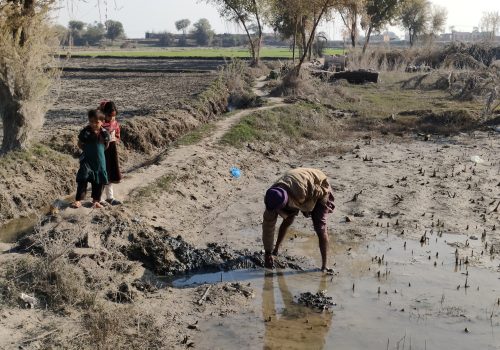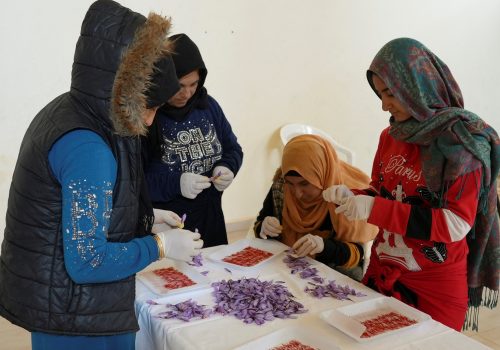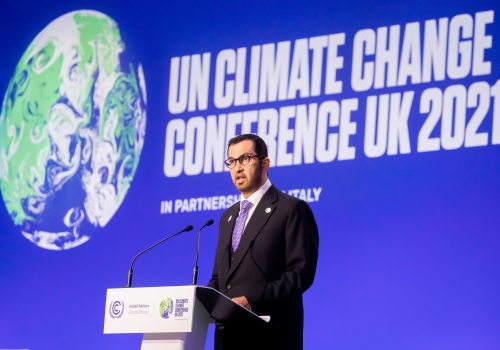COP28 is here. These are the Global South’s demands and expectations.
With the 2023 United Nations Climate Change Conference (COP28) having started (November 30-December 12), the world shifts its focus to the United Arab Emirates (UAE) to assess how it will deal with the climate crisis, but with particular attention to the Emirati COP presidency.
There’s been much controversy in the global climate community in the year leading up to COP, given that its president, Sultan Ahmed Al Jaber, is also the president of Abu Dhabi National Oil Company (ADNOC), the largest oil and gas company in the UAE. Phasing out of fossil fuels has been a thorny issue within the COP negotiations for several years, with the official COP text language indicating a “phase down” and not a “phase out” of fossil fuels. However, many groups—including civil society, the Alliance of Small Island States (AOSIS), and many from the Global South, such as countries in the African continent and the Least Developed Countries (LDCs)—indicate that a “phase out” is a necessary demand for this year’s COP in Dubai to reach the 1.5 degree Celsius warming target indicated under the Paris Agreement.
A Fossil Fuel Non-Proliferation Treaty has been in the works for some time as a critical action under this demand. It has been endorsed by many Global South countries as well as the European parliament. The Emirati COP presidency has a vital role in meeting the Global South’s demands concerning the fossil fuel phase-out while ensuring their oil interests are kept at bay.
Several other demands will be made this year at COP28 as it is a pivotal year on several fronts. As the Loss and Damage Fund (L&D) was agreed upon last year in COP27, it is up to the global community this year to decide on how this fund will be managed and who will put money in the pot. It was decided on November 3 that the World Bank would house the L&D Fund for an interim period of four years, by which the first funding arrangement needs to be disbursed within six months or else the World Bank board will decide who it will go to. Several elements have yet to be agreed upon, such as selection criteria for states under L&D, who will pay for the compensation, and how often and where this fund will be housed.
This year is also pivotal within the climate negotiations as the Global Stocktake, also referred to as the world’s “report card,” is being utilized. Under the Paris Agreement, countries agreed to limit warming to 1.5 degrees Celsius and submit Nationally Determined Contributions (NDCs) targets—regarding how much GHG emission reduction they would be able to do—to the United Nations Framework Convention on Climate Change (UNFCCC). These NDCs were calculated at COP26 in Glasgow in 2021 and found to be insufficient; at that rate, the world warmed up to 2.8 degrees Celsius and above. Thus, it was decided in Glasgow that states would go back home and see how to increase their ambition and targets to submit updated NDCs to reach a 1.5-degree limit.
This year, states have submitted their updated NDCs, and the Global Stocktake will assess these NDCs to determine whether or not they have reached the 1.5 degree limit, hence the report card. It is important to note that, in the last several years since COP26, much has happened across a global scale that has influenced states concerning energy transition. For example, the war in Ukraine has resulted in the withdrawal of natural gas from Russia to Europe, while Israel has appropriated natural gas fields offshore Gaza and provided licenses to companies for extraction, production, and export to Europe and the United States. This has changed the space of how the energy transition will take place on a global level; until now, natural gas has been pushed within the COP negotiations as a “transitionary fuel” for the “phasing down” efforts of countries, which hinders the demands for the “phasing out” of fossil fuels altogether.
Several other demands that will be made at this year’s COP include ramping up climate finance to meet the $100 billion disbursed by developed countries that have been pledged under the Paris Agreement. Until now, there hasn’t been a year where the $100 billion has been met with maximum disbursements ranging from $72-80 billion per year, depending on the accounting. Ensuring that the Global South receives the appropriate compensation from the Global North during this climate crisis is imperative to the success of these negotiations.
Additionally, this year, the Global Goal on Adaptation will be decided upon, which entails an appropriate target for adaptation for countries of the Global South. Climate finance thus far has focused on reducing emissions and less so on resilience and adaptation, which is indicative in that only 20 percent of climate finance goes to adaptation while 80 percent goes to mitigation. The Global South suffers the brunt of the impacts of the climate crisis and requires financing to be able to adapt to these impacts; instead it is being financed for reduction efforts for emissions that it did not cause. Ensuring that the Global South receives this compensation with particular emphasis on vulnerable populations is crucial for climate justice and equity.
The COP28 negotiations will prove to be challenging given all the demands and expectations on the table in this COP. In order to ensure that the needs of the Global South are met, the global community needs to unite to swiftly implement the recommended actions and the host country and the Emirati COP presidency need to display strong ambitions to address the climate crisis.
Lama El Hatow is a nonresident fellow with the empowerME Initiative at the Atlantic Council’s Rafik Hariri Center for the Middle East. She is also as a professor and program coordinator at Johns Hopkins University in the Environmental Science and Policy (ESP) and Energy, Policy and Climate (EPC) departments.
The opinions expressed in the article are those of the author.
Further reading
Thu, May 25, 2023
Developing countries need a loss and damage fund for climate change. How can COP28 make it happen?
MENASource By Lama El Hatow
A L&D fund is the last lifeboat for these countries after decades of struggle to achieve some form of global climate justice.
Fri, Sep 29, 2023
Cultivating change: Women as catalysts for agricultural transformation in the MENA region
MENASource By Marcy Grossman
By engaging women in decision-making leadership roles and providing them with access to education and training, a wellspring of innovative solutions can be unlocked to address challenges in agriculture, food security, and water security.
Tue, Jan 18, 2022
Is the GCC ready to embrace sustainable finance?
MENASource By
To avoid falling behind on their grand economic growth ambitions, Gulf Cooperation Council countries should act decisively by putting sustainable finance policies at the top of their agendas.
Image: Executive Secretary of the United Nations Framework Convention on Climate Change (UNFCCC) Simon Stiell, United Arab Emirates Minister of Industry and Advanced Technology and COP28 President Sultan Ahmed Al Jaber and Director-General of COP28 climate conference Majid Al Suwaidi attend the United Nations Climate Change Conference (COP28) in Dubai, United Arab Emirates, November 30, 2023. REUTERS/Amr Alfiky


